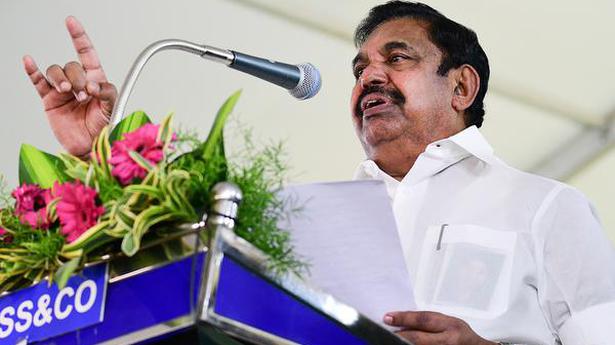
Madras HC Division Bench to consider on Monday Palaniswami’s plea to stay single judge’s order in favour of Panneerselvam
The Hindu
Palaniswami says, single judge’s order suffers from perversity and complete non-application of mind and that it will cause grave prejudice to him
An original side appeal preferred by All India Anna Dravida Munnetra Kazhagam (AIADMK) leader Edappadi K. Palaniswami against a single judge’s order nullifying the July 11 general council meet, when he was elected interim general secretary of the party, has been listed before a Division Bench of Justices M. Duraiswamy and Sunder Mohan of Madras High Court on Monday when his stay application would be taken up for hearing first.
Along with the appeal, Mr. Palaniswami had filed two sub applications - one was to dispense with the production of a certified copy of Justice G. Jayachandran’s August 17 order and the other was to stay the single judge’s order. He had filed a separate affidavit, through senior counsel Vijay Narayan, in support of his plea to stay the order, pending appeal, on the ground that grave prejudice and hardship would be caused to him otherwise.
However, no such prejudice or hardship would be caused to Mr. Panneerselvam if the stay was granted, he claimed. His affidavit stated that the single judge’s order seeks to forcibly impose on the party a decision which it did not make. The appellant pointed out that the single judge had passed an “unworkable” order even at the stage of considering an interlocutory prayer by Mr. Panneerselvam and not after a full fledged trial in his suit.
“In fact, the order itself recognises that the appellant and the first respondent (Mr. Panneerselvam) could not work together. While having held so, to hold at an interim stage that they have to only jointly call for the next executive council or general council meeting would result in stifling the activities of the party. It is an unworkable, irrational and arbitrary order. The learned judge had misconstrued several bylaws and ignored vital evidence,” he said.
Further, pointing out that the resolutions passed at the July 11 general council meet had been fully acted upon, the appellant said, there were absolutely no materials on record for the single judge to arrive at erroneous findings. The judge had passed the order by reversing the test for granting an injunction. He had traversed beyond the scope of the case by ordering status quo ante as on June 23 and therefore, a prima facie case had been made out to stay the order, he contended.
The appellant also stated the single judge ought not to have held that a 15-day written notice was necessary for the July 11 general council meet when the party bylaws do not require issuance of a written notice. He further said the single judge had misconstrued an invitation issued on July 1 to be a notice issued for the general council when the notice was actually issued orally at the June 23 general council meet and it was published widely in the media.
“The repeated attempts of the first respondent to claim himself as the Coordinator is only to stifle the functioning of the party and has no legal basis... Therefore, while there is no vacuum for the manner of functioning of the party, the first respondent is only seeking to create a confusion. The learned judge has ignored aspects in relation to the lapse of the posts of Coordinator and Joint Coordinator and has proceeded to grant reliefs in favour of the 1st Respondent,” he complained.











